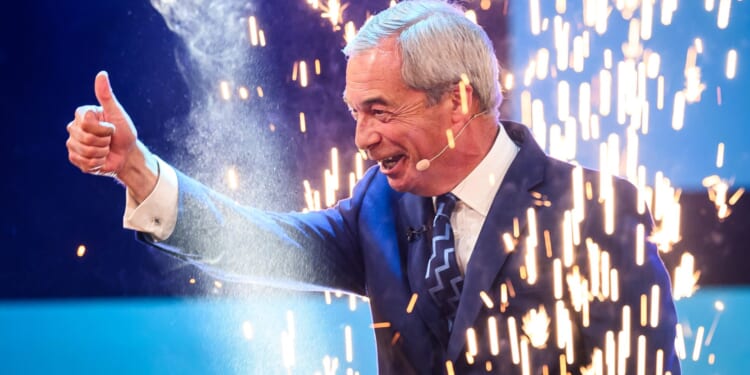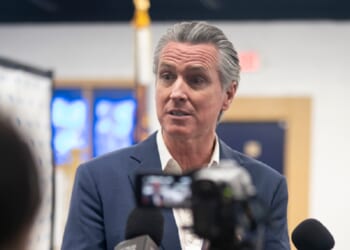“London is not the buzzy, bouncy place it needs to be,” Nigel Farage told an audience of Web3 investors, entrepreneurs and evangelists last month. He recalled instead a time when it had been exciting: the Eighties, when he was a commodities trader in the City. “The place was absolutely rocking and rolling and booming. Yuppies were everywhere, I was one of them,” he said. Loud ties, big pinstripes, earning lots of money but spending more. “It was great fun.”
The city, he said, could return to that former glory. A second “Big Bang” is possible, but some changes are needed. Playing a central part, he promised the crowd, would be crypto.
The Reform leader has been wooing the blockchain industry lately. Crypto might seem like an odd bedfellow for Reform given some of the party’s more nostalgic inclinations, but in Farage’s hands the industry becomes a throwback. Seemingly reminding him of his rip-roaring days on the floor of the London Metals Exchange, crypto allows him to talk about a sparkling vision of Britain as a financial hub once again.
This is not a jam and Jerusalem brand of nostalgia, but one of big hair and big phones and lunch at Sweetings. Crucially, this is a pre-Blair vision.
Farage has criticised the autonomy New Labour gave to both the Financial Conduct Authority and the Bank of England. Shifting power to those bodies, he argues, has allowed politicians to distance themselves from the regulations that put more burdens onto business. “We have to go back to the more old-fashioned way,” he told the crypto crowd last month. That is, elected officials must make the decisions and face the consequences directly.
For anyone familiar with the über-libertarian origins of crypto, increasing the involvement of central government may not sound particularly, well, punk. What you have to understand is that crypto is no longer the reserve of cypherpunks and Twitter anons; it is a thriving niche of the financial industry that employs just as many policy consultants and business development people as it does cracked hackers.
While there is certainly still an anarchic undercurrent, it is the “white collar crypto” contingent — both traditional finance firms adopting blockchain and crypto-native companies trying to stay on the straight and narrow — that would like to see politicians taking the sector more seriously.
Exact figures on the size of the UK’s crypto sector are hard to come by, and slightly depend on how you define the umbrella: everything from institutional investing in tokenised gold to Web3 gaming startups could be part of it. What we do know is that London has a leg-up on the rest of Europe, still just about benefitting from its reputation as the region’s financial centre. A report from K33 Research found that there were around 13,000 people employed by the sector in the UK back in 2023, triple that of closest competitor Germany.
Farage has therefore spotted crypto as a small but potentially influential area in which he can own the conversation. He has little competition. Politicians from other parties seem unable to talk about crypto, perhaps terrified of its less salubrious associations with fraud and speculation.
This was not always the case. While they were still in power, some of the more technologically literate Conservatives made steps towards embracing the crypto sector. As Chancellor, Rishi Sunak embraced a series of since-abandoned projects (sometimes I wonder if I’m the only one who remembers the shelved Royal Mint NFT) and made noises about making Britain a crypto hub. Matt Hancock was a blockchain advocate while he was a junior minister in DSIT and continued to be so long after it was fashionable. Bim Afolami made inroads with the industry during his brief stint as City Minister before being booted both out of government and out of his Hertfordshire seat last year.
The problem was that not much happened. At one point crypto was seen as a potential area in which the UK could have asserted its newfound independence from the EU, but instead it fell behind: the bloc became the first territory to pass legislation that was specifically designed for cryptocurrency, rather than regulating it under existing laws, in 2023. That regulatory certainty has threatened London’s position as the leading crypto location in the region, as companies plot expansion plans in the EU.
By last year’s election, crypto was fully off the agenda, and although the FCA is now finally plodding towards a regulatory regime for the sector, the new government has not staked out much ground here. That may partly be because it is already onto its third City Minister. In fairness Lucy Rigby, appointed in September, has already been out and about talking about tokenisation and meeting the founder of crypto leader OXK in recent weeks, but we are yet to see a shift in government policy.
Farage, meanwhile, gets to claim he was an early advocate for crypto. In fact he has been known to say he was the first politician to back it — something I imagine several Tories would dispute if any of them were still in public life.
Some of Farage’s earliest statements on crypto were made while he was working with Southbank Investment Trust. Back in 2020, he helped launch their investment newsletter, contributing his thoughts on investment opportunities, including crypto.
But what really seems to have bolstered both his conviction about the crypto space and his position within it was that whole kerfuffle with Coutts. When Farage publicly challenged the closure of his account with the Natwest subsidiary in 2023, he faced sneers and scepticism. Yet the conclusion of the whole affair proved he had been justified, allowing him to fashion himself as a kind of martyr to debanking. The experience has given him some common ground with crypto bros.
Debanking is a major issue for founders, employees and even customers of crypto companies. In the UK, half of firms in crypto and Web3 have either been rejected from opening an account or had one closed. Banks often put these decisions down to their anti-money laundering (AML) and know-your customer (KYC) obligations. But some think the approach is heavy-handed, likely to catch those with a legitimate connection to crypto, or even those with only a passing association.
While Farage’s experience was different, debanking still gives him a common cause. Several crypto-adjacent issues also fit into Reform’s wider approach to civil liberties. The party has begun incorporating online freedoms into its platform, pledging to repeal the Online Safety Act and criticising the police response to social media posts. A natural extension of that approach would be online financial freedom, allowing investors to put their money in whichever assets they please. Recent proposed limits on how much individuals can hold in stablecoins have provided a useful political wedge issue there.
“Several crypto-adjacent issues also fit into Reform’s wider approach to civil liberties.”
Resistance to central bank digital currencies (CBDCs) also goes hand in hand with the party’s opposition to digital ID. Issued and controlled by monetary authorities, CBDCs are unsurprisingly not always popular with crypto advocates. Farage even said at the Web3 conference that he would go to prison rather than be forced to use a CBDC. A brave stand, no doubt, though slightly undercut by the fact that the Bank of England has been cooling on plans for a digital pound and doesn’t look likely to introduce one anytime soon.
Perhaps none of this is surprising. Anyone who has followed the way Donald Trump has interacted with crypto will see a possible model for Farage. The crypto-rich became a lucrative source of donations to the campaign, and more recently to the White House’s new ballroom. Reform certainly seems conscious of a similar opportunity, having dedicated a page on its website pointing donors towards how to make a contribution using crypto.
Since taking office, Trump has continued to signal his favour for the industry. In March, for example, he issued an executive order to establish a Bitcoin federal reserve. Farage, for his part, says he has urged both the Bank of England and the Chancellor to use Bitcoin seized as part of criminal investigations to begin such a fund, saying it would help “further legitimise this space”.
Trump’s relationship with crypto, though, has raised eyebrows, not least when it comes to the dealings of his family’s own crypto company, World Liberty Financial. Farage will need to tread carefully to avoid similar suspicion — speaking at crypto events has already become part of his portfolio of side hustles. Whether he actually owns any crypto-assets himself though is unclear — there is no obligation, currently, for MPs to declare their crypto holdings in the same way they might for shares. Then there’s his association with crypto investor Christopher Harborne, who previously donated to the Brexit Party and more recently paid for two of Farage’s trips to the States.
Whether you think Farage is a true Bitcoin believer or an opportunist though, he demonstrates a deeper understanding of crypto than the US President, a former sceptic who seems guided by his sons in his crypto endeavours. In shaping a political narrative around the industry, too, the two men have very different approaches. While both might connect this new technology to their reminiscences about a financial heyday, Farage recognises the frustration of the industry and positions himself as an underdog alongside them, a martyr to the cause. In his telling, it’s more Passion of the Christ than Art of the Deal: just a way to make Britain a richer place, by bringing more well-paid jobs to London — if only Reeves would let them.
What exactly would that entail? Probably reining in the powers of both the Bank of England and FCA. But those expecting a bonfire of red tape and quangos may be disappointed. Farage isn’t totally anti-regulation, recognising that it can help stimulate investment when the rules are clear. In a world where he wins the next election, the FCA’s new regime will likely already be in place. Barring any major objections, it seems unlikely he would change it, preferring stability and clarity for businesses.
Where he might look at changes would be on the consumer side. Regulation can be bad when it “protects idiots from themselves”, Farage said at the conference. Regulators often have to find a balance between allowing people freedom to do what they will with their money and preventing them from coming to harm. That has led in some situations to rather tight rules for ordinary investors: up until October, only professionals were permitted to invest in crypto-based exchange-traded notes (ETNS). It would not be surprising if a Farage administration tipped the scales in favour of consumer freedom rather than risk aversion.
The right approach to that depends on whether you think crypto should be seen as analogous to stocks and shares or more like a wager on the horses. Finding a way to legitimise some of the trading going on in grey zones could be beneficial, not least for the Treasury’s coffers: the FCA reckons some 12% of adults own some kind of crypto asset. But it could come at a cost of consumer protection if firms are not held to the same standards as other financial institutions.
None of this, though, is necessarily a game changer when it comes to elections. Crypto can be a way of opening conversations about individual liberties, or over-regulation, or business investment. But it doesn’t tend to be a primary issue for voters, nor was it the magic bullet for reaching male voters in the US elections that some thought it might be.
Where it might make a difference is more broadly in the City’s buy-in to the Reform agenda. When I worked on a financial newspaper in 2017, it would have been hard to imagine Farage winning anyone round, so soon after Brexit. Now, he’s making speeches at Banking Hall and promising to appoint people with business experience as ministers, while bankers take meetings with his team behind closed doors. Crypto is just one item on an allegedly pro-business, pro-entrepreneur agenda, and also fits neatly into Farage’s stated desire to reward risk-takers.
People in the industry like to say that the crash that came after the collapse of FTX was actually a good thing, washing many of the bad actors and speculators out of the space. This is both true to some extent and difficult to take seriously, since those who have left always seem to be replaced by others. The excesses of the NFT boom have been exchanged for memecoins. Scams and hacks are still an everyday feature of the cryptosphere.
In this context, Farage’s retro-futuristic vision of a crypto-enabled “Big Bang” sounds risky. But it’s a calculated risk. Despite some of crypto’s crazier corners, the white-collar portion of the blockchain industry is increasingly professionalising, having been embraced by a once-sceptical Wall Street. Major firms take pains to show that they are compliant with local laws and are preparing for massive IPOs. Respected technology and finance firms are incorporating stablecoins into their plans for the future.
Much as Farage might think of himself as a maverick, he is following a path that global regulators and governments have already cut. As crypto sells itself as a legitimate, wealth-generating sector, countries around the world are figuring out how to give it room to grow. In fact, the UK is already working to align its approach with the US on digital assets and other financial innovations. His pitch, then, is far more psychological, symbolic even. It’s about recognising a group that has at times felt ignored or dismissed. Whether it’s based on fact or not, that can be a very effective message.

















